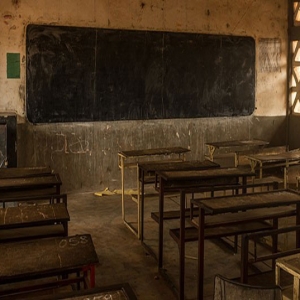
 Fr. Gaurav Nair
Fr. Gaurav Nair

Recent data reveals 37 lakh students dropped out of schools nationwide in 2023-24. Coupled with the changes and NEP in recent years, we must ask where we are going. These "developments" are eroding the fundamental purpose of educational institutions, that is, to nurture critical thinking and foster social mobility.
The transformation of educational spaces from intellectual discourse centres to ideological propagation vehicles represents a profound shift in India's educational landscape. The shift is not only specific to India. There is a worldwide shift in educational and thinking patterns. However, it is only in India that a person, party, religion and caste are being used to drive educational directives. The Rs 78.83 crores spent on Pariksha Pe Charcha over six years, compared to the Rs 13 crore annual budget of the now-defunct National Talent Search scholarship, is symbolic of the degeneration of a whole nation.
More concerning is the silent crisis of discrimination pervading our educational institutions. While enrollment statistics show declining numbers across genders, social hierarchies continue to shape educational access and outcomes. The intersection of gender and caste discrimination creates compounded barriers, particularly for females and persons from marginalised communities.
Student organisations, once vibrant crucibles of social change and critical thinking, have increasingly become echo chambers for dominant politics. The historic role of student movements in challenging social injustice and fostering democratic values is being supplanted by a culture of conformity and ideological allegiance.
Dilution of academic rigor through politically motivated curriculum changes and the promotion of uncritical acceptance over analytical thinking pose existential threats to India's future. Textbooks have become tools for ideological indoctrination rather than instruments of learning. We are producing generations incapable of questioning, analysing, and innovating.
To reverse this devolvement, we need to act on multiple fronts. First, educational institutions must be insulated from political interference through robust institutional frameworks. Second, we must revive and strengthen scholarship programs supporting talented students from marginalised backgrounds. Third, teacher training must emphasise critical pedagogy and inclusive education practices.
Unlike our dear PM, who only uses prepared speeches and answers rehearsed questions, educational institutions must actively foster environments where questioning is encouraged and different perspectives are valued. This includes creating safe spaces for discussing sensitive issues like gender and caste discrimination.
Most crucially, we need to rebuild the foundation of Indian education on the principles of critical inquiry, social justice, and intellectual freedom. India's future as a knowledge society and its aspirations for global leadership hinge on its ability to preserve and promote educational environments that foster critical thinking, challenge societal prejudices, and nurture innovation. The current trajectory suggests we are moving away from these essential goals. The time for course correction is now.